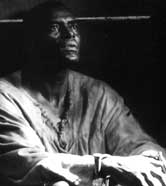






|
NAT TURNER: A TROUBLESOME PROPERTY
To emphasize the fictive component of historical reconstruction, the film adopts an innovative structure: interspersing documentary footage and interviews with dramatizations of different versions of the story, using a new actor to represent Nat Turner in each version. As literary critic Henry Louis Gates explains in the film, "There is no Nat Turner to recover; you have to create the man and his voice." The filmmakers chronicle an extraordinary history of attempts to create and to recreate the man. Such a complex film required a unique collaboration between MacArthur Genius Award feature director Charles Burnett, acclaimed historian of slavery Kenneth S. Greenberg and award-winning documentary producer Frank Christopher. The earliest source, "The Confessions of Nat Turner," was not written by Nat Turner but was assembled out of a series of jail cell interviews by white Virginia lawyer Thomas R. Gray. The man portrayed in this first telling of the Nat Turner story clearly saw himself as a prophet, steeped in the traditions of apocalyptic Christianity. However, this first confession of Nat Turner raised the question of whether the slave rebel was an inspired and brilliant religious leader in search of freedom for his people, or a deluded fanatic leading slaves to their doom. Viewers watch this same controversy play itself out over and over again during next 170 years of our nation's history. Historians Eugene
Genovese and Herbert Aptheker discuss how the figure of Nat Turner was
transformed as a metaphor whenever racial tensions flared. Religious
scholar Vincent Harding and legal scholar Martha Minnow reflect on our
nation's attitudes towards violence. Alvin Poussaint and Ossie Davis
recall how Nat Turner became a hero in the Black community. And when
William Styron published his Pulitzer Prize winning novel, The Confessions
of Nat Turner - and invented a sexually charged relationship between
Turner and a white teenaged girl he later killed - it unleashed one
of the most bitter intellectual race battles of the 1960s. Today, Nat
Turner's slave rebellion continues to raise new questions about the
nature of terrorism and other forms of violent resistance to oppression.
|
"In
light of current dread of terrorist assaults, Nat Turner:
A Troublesome Property boldly takes on special meaning. A dramatic
script, brilliant acting, and a compelling approach presents a tragic
and morally ambivalent story of unfathomable horror but also a desperate
cry for freedom. In its presentation of realism and myth, the film surpasses
Ken Burns's historical documentaries. Throughout, commentators, both
white and Black, furnish a broad range of perspectives that require
us to think deeply about American racial violence and our moral and
emotional reactions to it."
|
 Nat
Turner's slave rebellion is a watershed event in America's long and
troubled history of slavery and racial conflict. Nat Turner: A Troublesome
Property tells the story of that violent confrontation and of the
ways that story has been continuously re-told during the years since
1831. It is a film about a critical moment in American history and of
the multiple ways in which that moment has since been remembered. Nat
Turner was a "troublesome property" for his master and he has remained
a "troublesome property" for the historians, novelists, dramatists,
artists and many others who have struggled to understand him.
Nat
Turner's slave rebellion is a watershed event in America's long and
troubled history of slavery and racial conflict. Nat Turner: A Troublesome
Property tells the story of that violent confrontation and of the
ways that story has been continuously re-told during the years since
1831. It is a film about a critical moment in American history and of
the multiple ways in which that moment has since been remembered. Nat
Turner was a "troublesome property" for his master and he has remained
a "troublesome property" for the historians, novelists, dramatists,
artists and many others who have struggled to understand him.